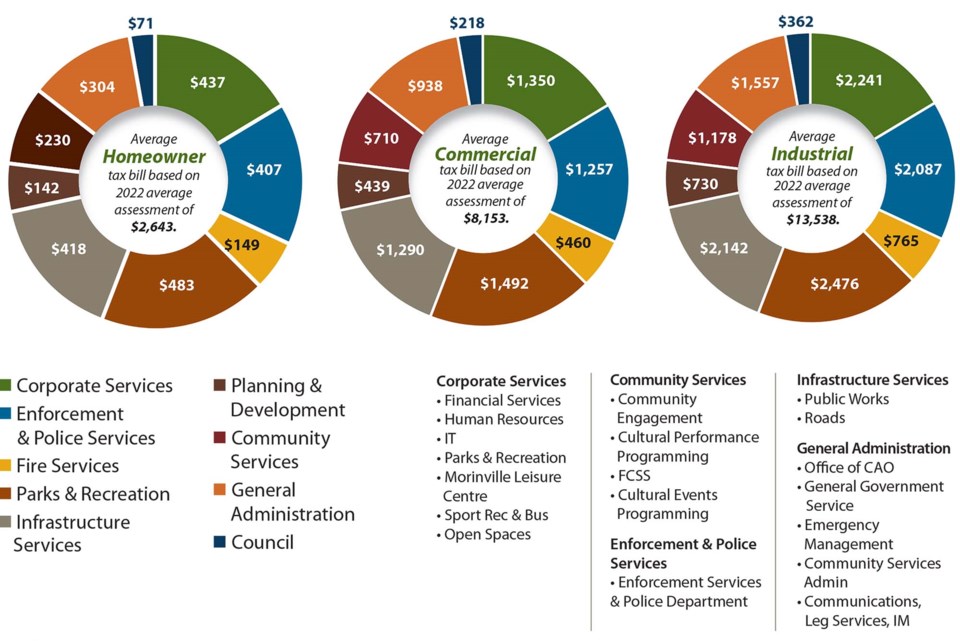Morinville council accepted the 2022-2024 operating and 2022-2026 capital budgets for debate during the Dec. 8 budget meeting.
(Instead of holding three readings on the budget as usual, council has this year elected to hold dedicated budget meetings which will lead to a single vote on the budget. St. Albert and Sturgeon County use a similar process.)
Council also directed administration to bring forth an interim budget for approval by Dec. 13.
“This budget right now seems really rushed,” said Coun. Scott Richardson, who proposed this interim measure, especially with so many new members on council.
Richardson said he did not intend for council to discuss the actual budget until January, starting with talks on the town’s fleet replacement and council and administrative pay policies at the Jan. 18 committee of the whole meeting.
Municipalities are required by law to pass a budget before the end of each calendar year, but can operate under an interim budget for part of a year.
Financial services manager Travis Nosko told council this temporary budget would cover the bare minimum needed to keep town services running and would have to be replaced by an actual budget with a tax rate before the town sets its mill rates next spring.
Five per cent proposed
The draft budget proposed a five-per-cent residential tax hike, which works out to a 14.56-per-cent non-residential hike once you apply the town’s 1:1.2 residential/non-residential tax split.
A five-per-cent tax increase works out to about $2,643 for the average home valued at $331,629, budget documents showed — that’s $125.85 or about 11 dozen Tim Hortons doughnuts more than 2021. The education and Homeland Housing requisitions (which are not set by the town) are projected to rise $17.01 and $0.66, respectively, for the average home.
The average utility bill is projected to rise $52.92 due to higher wastewater and stormwater rates and higher average water use.
On top of all that, administration has proposed a special one-year sidewalk and road rehabilitation tax of 0.81 per cent applied to all properties to pay for sidewalk and road repairs. This would cost the average homeowner $269.
All told, the average homeowner would pay $465.44 more in all taxes and fees under the draft budget — equivalent to about 42 dozen doughnuts or a bit more than a one-year adult membership at the Morinville Leisure Centre.
Tough choices ahead
The town will see a roughly six-per-cent jump in its costs next year due to higher RCMP wages, cuts to provincial grants, and inflation, which in the case of construction reached historic highs of up to five per cent, Nosko explained to council. The COVID-19 pandemic also tamped down on the town’s recreation revenues. The town saw no real growth in property values and is also moving to return to pre-pandemic staffing levels.
The town also continues to face a mounting tax-supported operating deficit, which this budget will rise to about $1.7 million. Nosko said this deficit is not sustainable, as it means the town is running down its savings. The town also has essentially no capital reserves left.
Plugging this budget hole in one year would require a 26-per-cent tax hike, Nosko said. Instead, administration proposed to gradually fill it over time and return to surpluses in about five years.
The budget includes just $2.8 million in capital spending due in part to a roughly 60-per-cent cut in the province’s Municipal Sustainability Initiative grant, council heard. Administration proposed the 0.81-per-cent special tax to cover road and sidewalk repairs, which council would have to renew and adjust each year. Edmonton, Wetaskiwin, and Calgary have similar taxes.
Capital projects include $220,672 to develop the 77 acres around the Morinville Leisure Centre, $30,000 to add dedicated poles to town hall for Indigenous flags, and $100,000 to design improvements to the 100 Avenue/Grandin Drive and 100 Street/Cardiff Road intersections (with actual construction slated for 2024).
New operational projects include a $120,000 update to the town’s engineering standards (last revised in 2005) and $20,000 to replace some decade-old streetlight banners.
Nosko said the budget administration tabled is as stripped down as it can get; any further cuts will mean lower service levels.
“Without question, the town is in a challenging financial position and difficult decisions are required of council,” Nosko said.
Mayor Simon Boersma said council needs to do a deep dive into the budget and seriously consider service cuts.
“What we heard at the door [during the election campaign] is our residents were looking for zero per cent,” he said of a tax change, noting the town raised taxes during the pandemic while other communities did not.
Boersma said he can defend the proposed road and sidewalk tax if administration can show him the exact roads and sidewalks the tax would fix. He also hopes to add his proposed two-year new business tax break to the budget before it passes.
Council will consider its interim budget Dec. 13.




